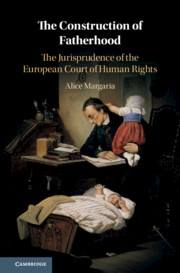Book contents
- The Construction of Fatherhood
- The Construction of Fatherhood
- Copyright page
- Dedication
- Contents
- Foreword
- Acknowledgements
- Introduction
- 1 Fatherhood and the Law in Europe
- 2 The ECtHR and Fatherhood: Limits and Potential
- 3 Fatherhood and Assisted Reproduction
- 4 Post-Separation and Unmarried Fatherhood
- 5 Fatherhood and Family–Work Reconciliation
- 6 Fatherhood and Homosexuality
- 7 Fatherhood at the ECtHR
- Bibliography
- Index
1 - Fatherhood and the Law in Europe
Published online by Cambridge University Press: 21 November 2019
- The Construction of Fatherhood
- The Construction of Fatherhood
- Copyright page
- Dedication
- Contents
- Foreword
- Acknowledgements
- Introduction
- 1 Fatherhood and the Law in Europe
- 2 The ECtHR and Fatherhood: Limits and Potential
- 3 Fatherhood and Assisted Reproduction
- 4 Post-Separation and Unmarried Fatherhood
- 5 Fatherhood and Family–Work Reconciliation
- 6 Fatherhood and Homosexuality
- 7 Fatherhood at the ECtHR
- Bibliography
- Index
Summary
Despite ‘family’ being a fluid concept, in Europe, the ‘dominant ideology of the family’ continues to identify the heterosexual nuclear family as the ‘ideal’, the ‘norm’ against which other family forms and practices are measured. This ideology prescribes a set of formal as well as functional features. First of all, it refers to a ‘white, heterosexual, married couple, with children, all living under the same roof’ and, as such, resonates with the image of the ‘sexual family’, to use Martha Fineman’s terminology. The ‘dominant ideology of the family’ rests, in fact, on the assumption that ‘the family’ originates from and revolves around a formally celebrated adult sexual affiliation. Apart from being based on a particular family form, this ideology ascribes specific family roles in accordance with a gendered division of labour: while the wife is the primary caregiver, the husband is the main breadwinner.
- Type
- Chapter
- Information
- The Construction of FatherhoodThe Jurisprudence of the European Court of Human Rights, pp. 4 - 18Publisher: Cambridge University PressPrint publication year: 2019



